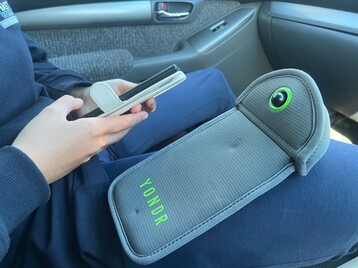Early Returns On Cell Phone Ban In Nantucket Schools: A Huge Success
JohnCarl McGrady •

Nearly two months into the school year, Nantucket teachers and administrators alike report that the school system’s new cellphone policy, which requires students to place their phones and other personal electronics in secure, magnetically locked bags at the start of each school day, has been a major success.
“It feels different, it feels good,” longtime wood shop teacher Mike Girvin said. “We’re in a better place.”
Seamus Galligan, who teaches health and wellness at NHS, said that last year, he had to stop class every few minutes to tell a student to put their phone away. He compared it to a game of whack-a-mole that he could never win. This year?
“I have yet to ask anyone to put a phone away,” he said.
Phone use in schools has become a major concern across the country in recent years as evidence mounts that teen cellphone use dramatically exacerbates mental health issues and slashes attention spans. Phone use is also tied to social isolation and suicide risk. Some evidence suggests that the mere presence of a phone, even if it is not accessed, reduces cognitive performance.
In schools, phones have become one of the largest causes of disruption, forcing teachers to dedicate significant time intended for education to device management. Nantucket teachers have raised concerns about phone use in class for years.
The school’s new policy, which applies to the Cyrus Peirce Middle School and Nantucket High School (NHS), was passed unanimously by the School Committee in June, with overwhelming support from teachers, parents, administrators, and subject matter experts. Now, the impacts are starting to be felt.
Girvin said that he and a group of other teachers he knows across a wide variety of disciplines have all noticed the change.
“Every one of us has celebrated a better fall than any of us remember,” he said.

NHS assistant principal Tracy Mailloux said that the policy has been a success, and that nearly all teachers and parents support it. She even thinks that many of the students have come around to the policy.
“A lot of kids have expressed appreciation that they’ve noticed a difference in their classrooms,” she said. “Kids have expressed relief.”
When the policy was first proposed, some parents raised concerns about safety and their ability to reach their students at school, but Mailloux said those concerns have largely dissipated, in part because of the consistent messaging from experts, including Nantucket Chief of Police Jody Kasper, that cell phone use during emergencies actually undermines safety.
Administrators and teachers told the Current that students are leaving class less often, paying more attention while in class, and talking to each other more.
“Instead of putting their heads down on the devices, they are interacting a bit more,” Galligan said. “It really has been a game-changer.”
Everyone who spoke to the Current for this article admitted that there was a transition period, and students were hesitant about the new policy at first.
“I think initially there was some pushback, and rightfully so. I was telling the kids it would be like taking away my coffee every morning. It’s going to take some getting used to,” Galligan said.
But Galligan said he is already noticing much less resistance, and students are reacting more positively to the policy this month than they were in September.
“It’s like a three-week period of withdrawal, where it’s like you’re getting them off heroin. They’re junkies,” Girvin said. “Then after that three-week period, they’re not fighting themselves as much.”
And it’s not just in class that the policy is having an impact. Girvin said he has also noticed students interacting more during lunch. Before the policy, Girvin said, students would play video games during lunch, eyes locked to their screens. That’s no longer the case.
“You can actually hear the difference,” he said. “It’s kind of a cool thing to me. I love to see them being more human.”

The policy isn’t perfect, Girvin said, but violations are less prevalent than some might expect. Mailloux agreed.
“The violations are not as many as people as would think,” Mailloux said. “You notice the kids that are doing something, not the ones that aren’t doing it.”
The policy for the Nantucket Intermediate and Elementary Schools is different, allowing students to keep their devices in their bags or backpacks as long as they are not used during the day.
Nantucket Public Schools is contracting with Yondr, a company focused on creating phone-free environments, to carry out the policy. Yondr is best known for specialized magnetically sealed pouches, like those used at NHS and Cyrus Pierce Middle School. At the School Committee meeting during which the policy was adopted, Superintendent Elizabeth Hallett said that she expects the program to cost roughly $30,000 the first year, with the cost born by the school system and not charged to parents.
Nantucket’s policy comes as Massachusetts debates mandating a similar ban statewide. Earlier this year, Massachusetts Attorney General Andrea Campbell proposed the Safe Technology Use and Distraction-free education for Youth, or “STUDY” Act, which would require schools to block students from using phones during the school day. The Act remains pending before the State House.